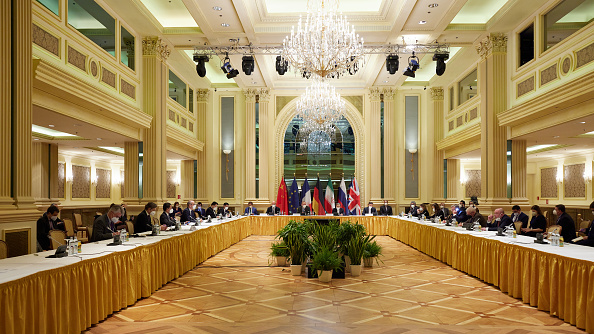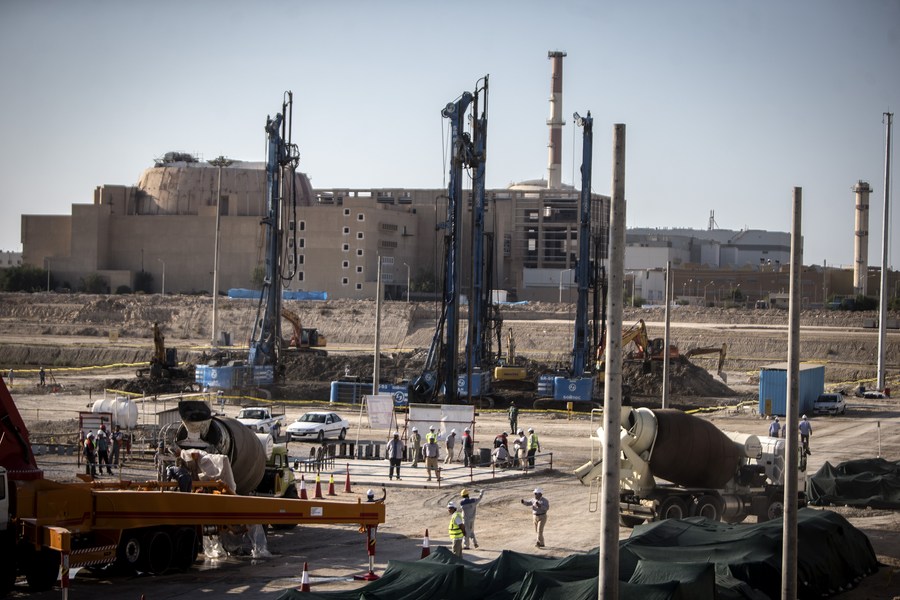
The Joint Comprehensive Plan of Action meeting held to discuss the full implementation of the Iran nuclear deal and the return of the United States to the deal in Vienna, Austria, April 15, 2021. /Getty
The Joint Comprehensive Plan of Action meeting held to discuss the full implementation of the Iran nuclear deal and the return of the United States to the deal in Vienna, Austria, April 15, 2021. /Getty
Editor's note: Javier Solana, a former EU high representative for foreign affairs and security policy, secretary-general of NATO and foreign minister of Spain, is president of EsadeGeo – Center for Global Economy and Geopolitics and Distinguished Fellow at the Brookings Institution. The article reflects the author's opinions and not necessarily the views of CGTN.
Diplomacy has always been the only sensible way to address U.S.-Iranian tensions. But when foreign policy rides on emotional currents and succumbs to gimmicky temptations, wise and subtle statecraft is relegated to the background.
This happened in the United States after the terror attacks of September 11, 2001, and it happened again during Donald Trump's bombastic presidency. Perhaps the best example was Trump's impetuous unilateral decision to withdraw the U.S. from the 2015 Iran nuclear deal.
That agreement – formally known as the Joint Comprehensive Plan of Action (JCPOA) – came about after years of arduous negotiations, only for Trump to dismiss it in a huff as part of his arrogant and shortsighted "maximum pressure" strategy toward Iran. But with Joe Biden now being president, talks that began this month in Vienna provide the main global powers with a diplomatic opportunity to salvage the pact.
We must hope that they succeed, because Trump's "maximum pressure" proved to be a resounding failure. The Iranian regime began to violate certain provisions of the JCPOA about a year after the U.S. withdrew from it in 2018. Since then, Iran has progressively increased the purity of its uranium enrichment, expanded its enriched-uranium stockpile 14-fold and hindered international inspections of its nuclear facilities. U.S. estimates of Iran's nuclear breakout time recently fell from over a year to three or four months.
Trump's ill-advised strategy not only increased the risks of nuclear proliferation, but also failed abysmally to curb Iran's regional military activities. U.S.-Iranian tensions have intensified in the Persian Gulf and particularly in Iraq, compounded by increasingly frequent (if barely seen) skirmishes between Iran and Israel.
Another cause for U.S. concern is that the Iranian regime has mitigated its international isolation by strengthening its relationship with China – including through a recent 25-year bilateral agreement that envisages heavy Chinese investment in the Islamic Republic in exchange for supplies of Iranian oil and gas. Enhanced security and intelligence cooperation is also part of the package.
As Trump intended, U.S. sanctions have wreaked havoc on the Iranian economy. Iran has even had serious difficulties importing COVID-19 vaccines and medical supplies. Nevertheless, key elements of the regime have emerged unscathed or even strengthened from the confrontation with Trump.
Notably, the powerful Revolutionary Guard – whose previous leader of extraterritorial and clandestine operations, General Qassem Suleimani, was assassinated last year by a U.S. drone – has taken advantage of the bankruptcy of private firms to strengthen its control over the economy. As Iran's poverty rate soared and COVID-19 spread, the Revolutionary Guard also bolstered its image as a provider of essential services, further undermining President Hassan Rouhani's relatively moderate government.
With Iran's radical factions increasingly emboldened ahead of the presidential election in June, the window of opportunity for supporters of the nuclear deal to revive the pact appears to be closing fast. Both Rouhani's government (whose second and final term is ending) and the new U.S. administration are very much aware of this and willing to fast-track a bargain.

The construction site of the second phase of Iran's Bushehr Nuclear Power Plant in Bushehr, southern Iran, November 10, 2019. /Xinhua
The construction site of the second phase of Iran's Bushehr Nuclear Power Plant in Bushehr, southern Iran, November 10, 2019. /Xinhua
In this regard, it bodes well that Biden has moved quickly to repudiate or recalibrate many of Trump's policies toward the Middle East.
Biden has tempered U.S. relations with Saudi Arabia, imposing sanctions on 76 individuals and the elite unit assigned to protect Crown Prince Mohammed bin Salman in connection with their role in the murder of Saudi journalist Jamal Khashoggi.
Likewise, Biden has distanced the U.S. from the Saudi-led military offensive in Yemen and reversed Trump's designation of the Houthi rebels as a terrorist group, in order to facilitate the delivery of food and other essential aid to a country currently suffering the world's worst humanitarian crisis.
The U.S. has also restored economic assistance to the Palestinians, which Trump had suspended virtually in its entirety. These measures demonstrate Biden's more sophisticated and nuanced approach to the region, which consists of supporting allies without giving them carte blanche and opposing adversaries without cornering them unproductively.
Implementing this approach – which has already brought about early signs of a diplomatic thaw between Saudi Arabia and Iran – will require dexterity. But there is no better starting point for successfully tackling the Middle East's most pressing and delicate challenges, such as nuclear proliferation.
The ongoing nuclear talks in Vienna – involving the five permanent members of the United Nations Security Council, along with Germany, Iran and the European Union – offer an excellent opportunity to show that multilateral great-power cooperation remains viable. The process got off to a good start, thanks in part to the Europeans' facilitation of indirect negotiations between the U.S. and Iranian delegations. The main stumbling blocks are the nature of the sanctions that the U.S. should lift and the sequencing of any return to compliance with the JCPOA. Both the U.S. and Iran insist that the other take the first step.
An added obstacle was the recent attack on Iran's Natanz uranium-enrichment plant – the country's largest – perpetrated during the negotiations and widely attributed to Israel. In retaliation, Iran announced that it would begin enriching uranium to 60 percent purity, three times higher than the 20 percent level to which it had hitherto adhered (and which already far exceeded the 3.7 percent allowed by the JCPOA). Iran is getting ever closer to the 90 percent enrichment level needed to produce a nuclear bomb, so the room for maneuver in Vienna is narrowing.
In international relations, the perfect is the enemy of the good and illusions are not a useful yardstick. The JCPOA was not intended to be a panacea, but defusing the nuclear proliferation threat is undoubtedly the best route to tackling troublesome Iranian behavior elsewhere in the region. Sabotage attempts such as the Natanz attack, from which the Biden administration was quick to distance itself, are certainly not an acceptable and sustainable alternative to diplomatic efforts.
It is worth remembering where we were before the JCPOA and reflect on where those who sought to demolish it have taken us. The downward spiral of tensions we have witnessed in recent years is reckless. Stopping it will necessarily involve intensive diplomacy – even more of which should follow.
Copyright: Project Syndicate, 2021.
(If you want to contribute and have specific expertise, please contact us at opinions@cgtn.com.)

